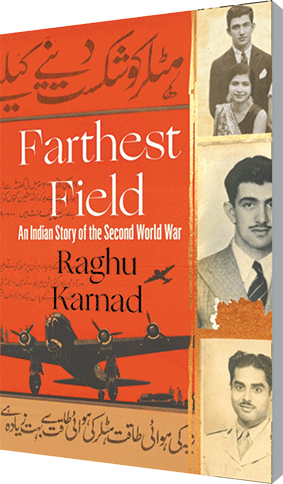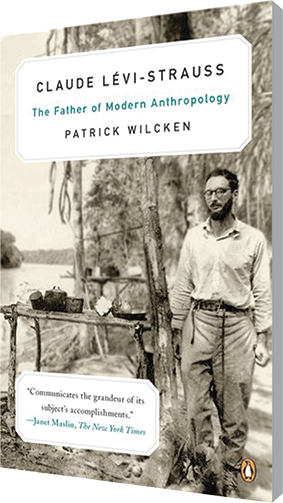Farthest Field: An Indian story of the second world war by Raghu Karnad fourth estate; Price: Rs.550; Pages: 300
 The re-telling in recent years of unsung deeds of valour of Indian soldiers and regiments fighting under the flag of imperial Britain during the two World Wars of the 20th century, has opened up a new, illuminating chapter in the history of the past century. Raghu Karnad reconstructs a family history that dovetails with the Second World War in the “farthest fields” of the West, in Iraq, Baghdad, Libya and Egypt and connects it with insurgencies in Manipur and Imphal on India’s eastern frontier.
The re-telling in recent years of unsung deeds of valour of Indian soldiers and regiments fighting under the flag of imperial Britain during the two World Wars of the 20th century, has opened up a new, illuminating chapter in the history of the past century. Raghu Karnad reconstructs a family history that dovetails with the Second World War in the “farthest fields” of the West, in Iraq, Baghdad, Libya and Egypt and connects it with insurgencies in Manipur and Imphal on India’s eastern frontier.
Karnad retrieves the stories of Godrej Khodadad Mugaseth, or Bobby, a Parsi from Calicut and his two brothers-in-law, Manek Dadabhoy and Ganny, married to two of Bobby’s three sisters. In a promising debut novel, Karnad brings the texture of social and political life in the backwaters of Malabar which sharply contrasts with life in the Madras presidency between 1936-1940, when young Bobby arrives there to go to college and stays on to continue his education in the engineering college at Guindy.
Being young and a rare Parsi helps in making new friends who speculate about the imminent World War II even as they celebrate milestones in nationalist politics like the swaraj movement led by Mahatma Gandhi and the formation of the provincial government of Madras presidency in 1937. Bobby’s sister Kosh or Khorshed’s courtship and marriage with the dashing Manek is set off against that of his other sister Nugs (Nurgesh) who falls in love with Kodandera Ganapathy (‘Ganny’), a native of Coorg, in medical school. In some ways the siblings, including the Oxford-educated eldest, Subur, who had been disowned as she had married outside the Parsi community, live life in Madras on their own terms, away from parental disapproval, enjoying every moment of their personal freedoms.
In political terms, imperial Britain’s declaration of war against Nazi Germany, followed by then Viceroy Lord Linlithgow’s declaration of India’s participation, creates conflicting loyalties and confusion. Should Bobby and his siblings support imperial policies or heed the voices of nationalist leaders calling for non-cooperation and Quit India? The family is confronted with the paradox of promoting the concept of freedom and anti-fascism in the European theatre even as the freedoms being fought for are denied to loyal Indian subjects. Declaring allegiances in the war either pro-British or pro-nationalist brings its own rewards and punishments. Ideology vies with opportunism, patriotism with loyalty even as the brothers are inducted into army training programmes.
In 1941 after Hitler’s invasion of the Soviet Union, Manek patrols the North Western Frontier, “cocooned in the cockpit of his Hawker Audax, 2,500 feet above the mineral sea of Waziristan” after he is commissioned into the Royal Indian Air Force.
Retrained in Bhopal to fly Hawker Hurricanes, in April 1943 he is despatched to Imphal, the North-Eastern Frontier, to fly over Burmese jungles to locate the survivors of Gen. Wingate’s Chindit guerrillas who had been sent deep into northern Burma to ambush Japanese patrols and blow up railway lines. But a month into his new mission, while returning to base in low-visibility monsoon conditions, Manek’s plane crashes into a hill inside Indian lines. Although his wife Kosh is devastated, his burial in Imphal brings the family closer.
Meanwhile, Ganny, who much to the chagrin of Nugs, has enlisted in the Indian Medical Service, is sent off to the Combined Military Hospital in Thal (North West Frontier) in 1942, and succumbs to asthmatic bronchitis aged only 26. On the news of his death, his pregnant widow travels alone for six nights by train to Madras to be received by her sisters and to give birth to a baby girl. The baby and Ganny’s death reconciles Nugs with her parents.
The main protagonist Bobby’s life follows a different trajectory. In 1942, he is inducted into the Bengal Sappers under the 161st Indian Infantry Brigade. More than a year after receiving his commission, he believes he is “dragging his heels in Roorkee” while the “world is breaking up”.
Finally, he too is sent to the dreaded North-East Frontier as the British Indian Army readies for a full offensive against the Japanese to thwart their entry into India. As preparation and strategy for an offensive are being finalised, Bobby finds war has “seeped into his life as rainwater fills a trench, inch by inch, less exhilarating and more chilling with each drop”.
Karnad’s sensitive description of the physical and psychological toll that offensives and battles in the Imphal-Kohima region extract from Bobby’s family, and fears of a Japanese invasion together with Subhash Chandra Bose’s Indian National Army, capture the complex emotions in play in the summer of 1944. Bobby realises the Indian Army has created history by defending its borders against its own comrades and is appalled by the futility and waste of human resources involved. Before the war finally ends, Bobby dies in November 1944, though the actual details of his demise remain shrouded in wild conjecture.
Though Karnad narrates a history of death, separation and loss suffered by a single family, by placing the story against the historical impact of not just the Great War, but the gradual dissolution of the British empire in South Asia and the shaping of the nationalist trajectory, he has embedded the narrative into a larger context. In an imaginative re-telling of untold histories, Karnad has paid overdue tribute to the subaltern heroes of the British Empire.
Jayati Gupta
Anthropology pioneer’s biography
Claude Levi-Strauss: The Father of Modern Anthropology by Patrick Wilcken penguin books; Price: Rs.1,269; Pages: 432
Born into a bourgeois French-Jewish family in Paris, Levi-Strauss as an only child benefitted enormously from the artistic inclinations of his painter father. Influenced by Marxism, linguistics, psychoanalysis, music, and geology, the young Levi-Strauss sought out ethnological data to articulate a theory that emphasised the integral connectedness between all human societies.
Influenced by Roman Jakobson, the Russian poet and linguist, and then by phenomenology and existentialism (with Merleau-Ponty and Sartre as contemporary intellectuals), and from the works of De Saussure, Levi-Strauss gave legitimacy to the deployment of linguistic analyses and to the generation of what have became lexicons of structural analyses: binary pairs and oppositions; inversions, symmetries, and hidden harmonies.
Ambitious, he tried to link his ethnographic materials to the new sciences of cybernetics and communication  mathematics, thereby contributing to the early ideas of cognitive sciences. His books ranging from the Elementary Structures of Kinship, The Savage Mind, Race and History, The Way of the Mask, The Jealous Potter, The Raw and the Cooked, the quartet on Mythologies, and the internationally popular Triste Tropique were by 1960-70s considered foundational works in anthropology.
mathematics, thereby contributing to the early ideas of cognitive sciences. His books ranging from the Elementary Structures of Kinship, The Savage Mind, Race and History, The Way of the Mask, The Jealous Potter, The Raw and the Cooked, the quartet on Mythologies, and the internationally popular Triste Tropique were by 1960-70s considered foundational works in anthropology.
In his long life (he lived to be nearly 101 dying a few months before his 101st birthday in 2009), as biographer Patrick Wilcken rightly notes, LeviStrauss not only endowed intellectual recognition on anthropology as a discipline, but also assigned civilizational status to indigenous peoples. Despite relativism’s assertion of the varied values of different societies, it was he who brought recognition to indigenous societies, rendering them intelligent and enabling them to be represented beyond the romantic and Rousseauian ideas and images as ‘noble savages’. Elaborating in his vast oeuvre Levi-Strauss strived to show that despite nose-plugs, penis sheaths, face-paint, and unlettered worlds, the “underlying structures” of indigenous peoples represented by their myths, religion, kinship, music, songs, and art were as meaningful, sophisticated and complex as of western civilization.
In his numerous works he sought to show “indigenous cultures in a new light, as creative but systemized, idiosyncratic yet ultimately of a piece”. The indigenous as Levi-Strauss went on to stress, were not only “good to think” as were their totems, but were the mirror image of modern societies. Elements of these indigenous cultures were repositories of meaning; “myth is like a musical score; kinship a variation on a theme; culture is nature mediated by the mind; structuralism is the search for “hidden harmonies”; simplicity underlies complexity; order chaos.
As elaborated in his most popular book, Tristes Tropiques, LeviStrauss did visit India and Pakistan, two newly created postcolonial nations, as they emerged from the pains of Partition. Visiting Karachi, Dacca, Chittagong Hills, Calcutta, New Delhi, Lahore and Peshawar, he wrote what Wilcken describes as “his most misanthropic writing” where he recalled “teeming cities, festering slums and dull, functional apartment blocks”. Engaging in a short ethnography of the Kuki tribes in the Chittagong Hills, he included them in his description of examples of generalised kin exchange. Such travels including that of his visit to Japan (which he saw as the mirror of France), enabled Levi-Strauss to be prescient about the ecological degradation that was to set in once natural regions and in the linked devastation of indigenous peoples.
Several of Levi-Strauss’ criticisms about the implications of the erosion and displacement of indigenous cultures have come true. That we must read today about how the once proud Nuer and Dinka of southern Sudan, subject to long years of war and strife, are now reporting cases of cannibalism and vast numbers of their precious children are now recruited into militias, and the extant stories of the diminishing cultures and numbers of such peoples is testimony to the march of capital and modernity.
Although Wilcken is meticulous in documenting Levi-Strauss’ response to key changes in the late 20th and early 21st centuries, he does not document what Levi-Strauss’ response was to international environmental activism that has provided new visibility to the indigenous peoples of South America. That some members of these indigenous groups represented their views and objected to the continued exploitation of their natural resources by attending public hearings and parliaments in western nations and even the United Nations Assembly, must surely have been noted by their staunchest cultural supporter.
Currently, in the second decade of the 21st century we are witness to a resurgence of an altered structuralism that focuses on identifying the underlying structures and the links between animal, human and ecological worlds. Witness the centrality that books such as Eduard Kohn’s How Forests Think occupy or Philippe Descola’s (Levi-Strauss’ student and successor to the chair in the College de France) eminence in the world of anthropology, and the content of much of the essays in the open access anthropological journal, HAU. Pure structuralism has lost its force and a renewed poststructuralism combining with eclectic theories of culture and agency, deconstructionism, symbolism, postcolonialism, and even subaltern studies among others now hold sway in international academic circuits.
Perhaps the best message this intellectual biography provides is to note how theories gain and lose status, and that the most astute minds of academia have not really contributed to salvaging the most vulnerable societies of the world. And, anthropological theories continue to be spun in the never ending search for definitions of culture, understandings of societies, and representations of varied life-worlds.
A.R. VASAVI (Excerpted from The Book Review, January 2016)























